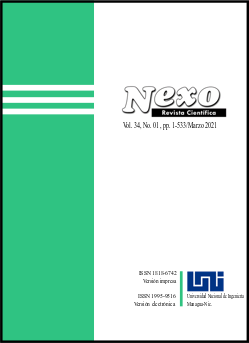Size effects in ultrafine iron. New structures: 2D - 3D
DOI:
https://doi.org/10.5377/nexo.v34i01.11282Keywords:
Electron microscopy, Iron, Mössbauer spectroscopy, Nanoparticles, New state of ironAbstract
This article is devoted to the analysis of the size of iron nanoparticles impact on the structure, to comparison of the results obtained for the nanopowders in the various authors’ researches. The article considers factors that may impact on the form and parameters of the Mössbauer spectra of iron nanopowders obtained by the inert gas condensation technique (Gen-Miller’s method). Possible causes of the new state of the iron are proved with the effective magnetic field at the 57 Fe nucleus (H=365 kOe). But the results related to size effects differ from the researches of other authors. It was revealed that nanoparticles with a mean (X-ray data) particle size of 50 nm have also Angstrem patterns, which can meet the new structure. Presence of small amounts of superparamagnetic oxide could be a catalyst, impetus for the formation of the new structure, and also, at the exchange interactions, could modify the charge of the electron density at the Fe nuclei. Reviewed and other factors can result in appearing of such a high value of the effective magnetic field at the iron nuclei.
Downloads
Downloads
Published
How to Cite
Issue
Section
License
The authors who publish in Nexo Scientific Journal agree to the following terms:
- Authors retain the copyright and grant the journal the right of the first publication under the license Creative Commons Attribution License https://creativecommons.org/licenses/by/3.0/, which allows others to share the work with a recognition of the authorship of the work and the initial publication in Nexo Scientific Journal.
- Authors may separately establish additional agreements for the non-exclusive distribution of the version of the work published in the journal (for example, in an institutional repository or a book), with the recognition of the initial publication in Nexo Scientific Journal.
- Authors are allowed and encouraged to disseminate their works electronically (for example, in institutional repositories or in their own website) before and during the submission process, as it can lead to productive exchanges, as well as earlier and greater citation of published works.











